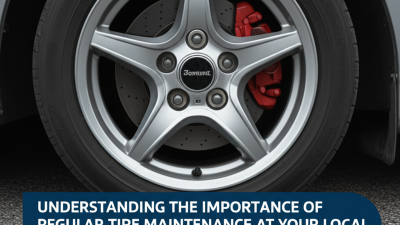14 Toro Road Toronto, Ontario
Understanding the Importance of Regular Tire Maintenance at Your Local Tire Center
Regular tire maintenance is crucial for ensuring the safety and longevity of your vehicle, and a local tire center plays a vital role in this process. Tires are the primary contact between your vehicle and the road, and neglecting their upkeep can lead to serious consequences, including reduced performance, increased fuel consumption, and even accidents. In this guide, we will explore the essential practices for maintaining your tires, such as routine inspections, proper inflation, and tread depth checks. By understanding the importance of these maintenance activities and leveraging the expertise available at your local tire center, you can ensure that your tires remain in optimal condition, enhancing your driving experience and safeguarding your investment. Whether you are a seasoned driver or a new car owner, this information will empower you to take proactive steps in tire care and maintenance, contributing to safer journeys ahead.

The Role of Regular Tire Maintenance in Enhancing Vehicle Safety
Regular tire maintenance plays a pivotal role in enhancing vehicle safety, a factor emphasized by the National Highway Traffic Safety Administration (NHTSA). According to their data, improper tire maintenance contributes to over 10,000 accidents each year. Keeping tires properly inflated not only improves fuel efficiency but also increases traction and handling, drastically reducing the risk of flats and blowouts. Research indicates that under-inflated tires can lower fuel efficiency by as much as 3%, further stressing the importance of regular checks.
Moreover, tire alignment and rotation are essential practices that contribute to a vehicle’s safety. The Tire Industry Association reports that regular alignment checks can extend tire life by up to 25%, which directly correlates with improved vehicle stability and control. By visiting a local tire center for routine inspections, drivers can ensure that their tires are not only in compliance with safety standards but also equipped to handle various driving conditions, enhancing overall driving safety. Regular tire maintenance is thus not only an economic decision but a crucial component of vehicular safety.
Understanding the Impact of Regular Tire Maintenance on Vehicle Safety
This bar chart illustrates the importance of various tire maintenance aspects in enhancing vehicle safety. Proper tire inflation ranks highest on the impact scale, followed by tread depth and alignment, while rotation and balancing are also important but slightly lower in their impact on safety.
Key Benefits of Proper Tire Inflation and Its Impact on Fuel Efficiency
Proper tire inflation is crucial for maintaining vehicle performance and maximizing fuel efficiency. When tires are inflated to the correct pressure, they provide optimal contact with the road, which reduces rolling resistance. This means that the engine doesn’t have to work as hard to propel the vehicle, ultimately leading to better fuel economy. In contrast, under-inflated tires can increase fuel consumption by up to 3%, as the vehicle expends more energy to overcome the added friction of improperly inflated tires.
In addition to fuel efficiency, maintaining proper tire pressure also enhances safety. Correctly inflated tires improve handling and reduce the risk of blowouts, especially during long drives. Tire wear also becomes more even, extending the lifespan of the tires and providing drivers with a smoother ride. Regular maintenance checks at your local tire center can help ensure that your tires are always in optimal condition, benefiting both your wallet and your overall driving experience.
Understanding the Importance of Regular Tire Maintenance at Your Local Tire Center - Key Benefits of Proper Tire Inflation and Its Impact on Fuel Efficiency
| Maintenance Activity | Recommended Frequency | Impact on Fuel Efficiency (%) | Potential Cost Savings ($/Month) |
|---|---|---|---|
| Tire Pressure Check | Monthly | 3-4% | 15-20 |
| Tire Rotation | Every 6,000 miles | 1-2% | 5-10 |
| Visual Inspection | Monthly | 0.5-1% | 2-5 |
| Alignment Check | Every 12,000 miles | 2-3% | 10-15 |
| Tread Depth Check | Monthly | 0.5-1% | 2-5 |
Understanding Tire Tread Depth: How It Affects Performance and Stability
Tire tread depth is a critical factor that directly influences a vehicle's performance and stability. Adequate tread depth ensures that tires can effectively channel water away, reducing the risk of hydroplaning during wet conditions. When the tread wears down below a certain threshold, the tires lose their grip on the road, significantly increasing stopping distances and compromising overall safety. Regularly checking the tread depth at your local tire center can help drivers maintain optimal performance, particularly in adverse weather conditions.
In addition to safety, proper tread depth also contributes to better fuel efficiency and a more comfortable ride. Tires with good tread depth reduce rolling resistance, which can enhance fuel economy and lower overall operating costs. Moreover, tires in optimal condition provide improved traction and handling, allowing for more responsive steering and stability during cornering. Routine inspections and maintenance at a tire center are essential to ensure that the tread depth remains within recommended levels, safeguarding both the driver and passengers while maximizing the vehicle's overall performance.
Importance of Rotating Tires Regularly to Extend Their Lifespan
Regular tire maintenance, especially the practice of tire rotation, is essential for extending the lifespan of your tires and ensuring optimal vehicle performance. According to the Tire Industry Association, regularly rotating your tires can enhance their lifespan by up to 20%. This practice helps in achieving uniform wear and tear, which is crucial since front and rear tires experience different levels of stress and wear based on driving habits and vehicle design.
Incorporating routine tire rotations every 5,000 to 7,500 miles not only prolongs tire durability but also improves vehicle safety. A report from the National Highway Traffic Safety Administration indicates that proper tire maintenance, including rotation, can significantly reduce the likelihood of tire blowouts, which are a leading cause of road accidents. With evidence suggesting that approximately 80% of tire-related crashes are linked to improper tire maintenance, visiting your local tire center for regular rotations becomes a critical responsibility for every driver.
The Financial Impact of Tire Maintenance: Cost Savings vs. Accidents and Repairs
Regular tire maintenance is a crucial investment that can lead to significant financial savings for vehicle owners. Properly maintained tires enhance fuel efficiency, as tires that are appropriately inflated and aligned reduce rolling resistance. This means less energy is required to propel the vehicle, leading to lower fuel costs over time. Moreover, routine checks for tread depth and overall tire condition can prevent premature wear, extending the life of the tires and deferring the need for replacements, which can be costly.
On the other hand, neglecting tire maintenance can have severe repercussions that may lead to accidents and expensive repairs. Worn-out tires or those with insufficient air pressure can cause decreased traction, increasing the likelihood of blowouts or loss of control, particularly in adverse weather conditions. Such incidents often result in costly repairs not just for the tires but also for damages to the vehicle and potential medical expenses from injuries. Thus, regular visits to a local tire center for maintenance can mitigate these risks, ultimately proving to be more economical than facing the consequences of improper tire care.
Related Posts
-

Maximize Your Adventure: The Ultimate Guide to Choosing Off Road Tires for Every Terrain
-

Exploring Tire Places: Key Industry Trends from the 138th China Import and Export Fair 2025
-

Experience Unmatched Performance with Our Premium Sport Tires for Every Driving Enthusiast
-

5 Essential Benefits of All Terrain Tires: Elevate Your Vehicle's Off-Road Performance!
-

The Ultimate Guide to Choosing the Best All Terrain Tires for Every Adventure
-

Exploring the Impact of Van Tyres on Trade Dynamics at the 138th China Import and Export Fair 2025

